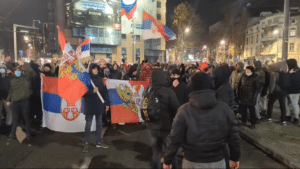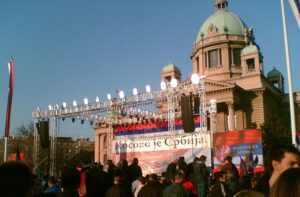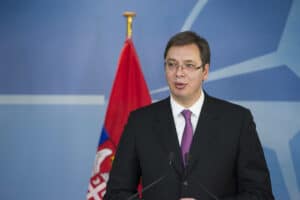Since late December 2017 relations between Kosovo and the European Union and the United States have come under pressure over the Kosovo Specialist Chambers (KSC), more commonly known as the Kosovo war crime court that will prosecute war crimes allegedly committed by Kosovo Liberation Army (KLA). Members of the Kosovo Parliament supported the initiative to revoke the law that established the legal basis for the Kosovo tribunal. President Hashim Thaçi stated that although he didn’t support the court, the court couldn’t be revoked by the Kosovo’s Assembly. Thaçi argued that the establishment of the court was the lesser of two evils. “We had two opportunities – for this court to be established by [UN] Security Council with Russia and China, or to be established by us within our legal framework.” Thaçi has been seen as one of the supporters of the initiative. Lately he called the court ‘’historical injustice’’.
A special court
Kosovan cooperation in the Kosovo Special Chambers is essential. The status and position of the KSC is quit unique. Since the early 2000’ the EU and the United States were looking into the possibility of (trying) KLA veterans for their possible war crimes during the Kosovo War (1998-1999). Some KLA officers, like current Kosovan Prime Minister Haradinaj, had already seen trail by the International Criminal Tribunal for the former Yugoslavia (ICTY). A more dedicated court to the Kosovan case seemed however necessary. After the formal independence of Kosovo in 2008, the EU pressured Kosovo for the creation of a court to would look into possible war crimes. In 2014 an initiative for the creation of such a court was presented by a group of MP’s in the National Assembly. The initiative was driven by support of Europe. The EU was prepared to bare the costs of the court. With outside pressure mounting the Assembly passed the law.
The court was formally established in 2016 under Kosovo legislation. Brussels became the patron of the court. International judges were appointed on behalf of the European Union to protect the courts integrity. Surprisingly the court wasn’t established in Kosovo, but in the Hague. The Netherlands and Kosovo signed in 2016 an agreement in which the granted the European Union access to the location in the Hague on behalf of both countries. The reason that the court is located in the Hague is for security reasons. The court could have become a target in Kosovo for ethic violence. This makes the KSC a Kosovan court created by Kosovan law located in The Hague via a bilateral agreement with the Netherlands that’s makes the European Union the responsible party.
The role of Kosovan politics
One of the biggest players still remains Kosovan politics itself. It seems odd that the Assembly just two years ago approved the creation of the court, is now calling for its dismantling. The revoking initiative that was presented in December originated from a group of forty three MP’s, out the hundred twenty MP’s in the Assembly, with the support of powerful figures in the government like president Thaçi and Prime Minister Haradinaj. A number of politicians in this group have a KLA past. Thaçi was one of the political leaders of the KLA during the war. In a 2010 report from the EU Thaçi was accused of an number of crimes during the war like organ theft and trade. Haradinaj was a military commander during the war and has been accused of illegal executions, torture and ethnic cleansing. In 2005 and 2011 he had to appear for the ICTY. Both times the cases were dropped after the judges didn’t found the enough evidence to convict him. It shows that a grim past surrounds certain political figures in Kosovo. If this fact is combined with the rumors in the Kosovan media that the first indictments of former KLA officers were only months away, it becomes evident that this move could be completely self-serving.
Seeing opposition to the court as only self-serving would not do justice to the position of KLA veterans in Kosovan politics and society. KLA veterans are seen as hero’s in Kosovo. After years of Serbian oppression the KLA created the path towards independence. NATO’s air war against Serbia in 1999 also serves as evidence for the Kosovan population that the war of the KLA was a just war. It is then almost natural to assume that people who fought a just war can’t be criminals. The relatively small population makes it also possible that more people in society are associated with these veterans. This resulted in the protected status of the KLA veterans. The prospect of veterans being convicted for crimes is unthinkable. Such as a move would be a blow to the Kosovan national moral.
With such strong support from the society politicians in Kosovo are able to call for the protection of the veterans. The ruling nationalistic PANA coalition, consisting of the Democratic Party of Kosovo, the Alliance for the Future of Kosovo and the Initiative for Kosovo, has made it clear that it would protect KLA veterans. Just in December Thaçi pardoned three convicted KLA veterans for murder of an Albanian Kosovan family during the war that allegedly collaborated with Serbians. Although the pardoning was highly controversial in Europe, it was widely supported in Kosovo. The biggest opposition party, Vetëvendosje, supports PANA coalition on this.
From this position it’s only a small step in rejecting the court. Vetëvendosje leader Albin Kurti is also opposed to the court. ‘’We opposed that court then, and we will oppose it now,” Members of the ruling PANA coalition are more vocal in their criticism. Speaker of parliament, Kadri Veseli, underlined this in a public statement on January 20th: “Kosovo deserved this to happen least in the world, but it will happen even though there are hundreds of arguments that speak against it! It is an injustice that is being done in the name of justice!”. Opposing the court in Kosovo is part of daily politics. This doesn’t mean that every politician was willing to support the revoking initiative. Kurti and Veseli both argued that the court can’t be stopped.
The international community was surprised by the Kosovan initiative. On January 4, the so-called Quint states, the United States, Germany, Great Britain, Italy and France published a statement in which they condemned the move by Kosovo. ‘’Such a move calls into question Kosovo’s commitment to the rule of law and risks all that Kosovo has achieved. It puts the interests of certain individuals above the interests of Kosovo society.’’ The pressure of the West has likely pushed back the support for the revoking law in Kosovo. Speaker Veseli openly decelerated on January 20th that the court couldn’t be stopped. Now that president Thaçi has done the seams it likely that the court will survive.
Sources: Reuters Balkan Insight



